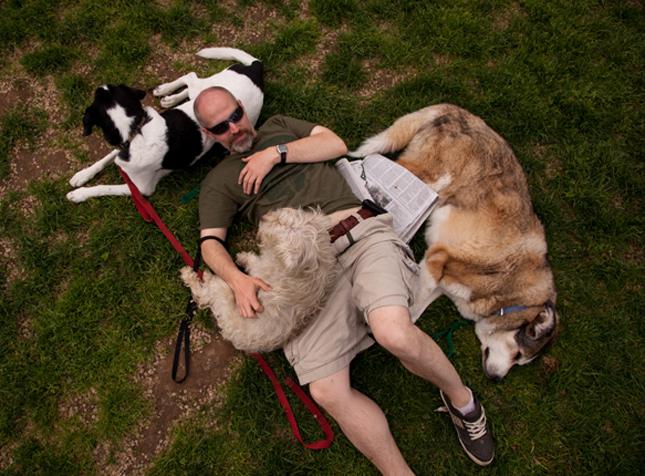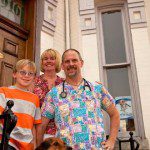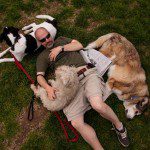Dr. Lee Morgan is, in many ways, the most satisfied of men.
“I can’t think of anything I’d rather be doing, anyone I’d rather be, except maybe an astronaut,” he says.
Morgan seems like a man who has found his niche, not like a safety net, but rather a place to be everything all at once: husband, father, family man, scientist, doctor, pioneer, responsible community person and a person who loves what he does.
“It’s not just my job, it’s my life,” he says of the Georgetown Veterinary Hospital, which he bought eight years ago and now runs. Love and empathy for animals, a key curiosity about advances in the veterinary field and interaction with person and pet alike coalesce there at 2916 M Street, the heart of Georgetown.
You might think when you first go into the greeting room at the clinic that Morgan is something of a celebrity doctor: there’s signed pictures of rocker Sheryl Crow, Karen Feld, who’s always brought her toy poodles and George Stevens Jr., the Georgetown resident who’s also producer of the Kennedy Center Honors.
“Not so much celebrity,” he says. “We just have a lot of good clients, the residents in Georgetown especially. Mr. Stevens is one of them, and they’re the kind of people that go that extra mile for their pets. They’re willing to do anything that’s needed.”
After a conversation with Morgan in the back room at the clinic, and taking into account his record, achievements and story line, you could get all sorts of impressions of the man: he’s gregarious, he loves to interact, and he’s high-energy. He’s well trained, smart, warm and a complete sucker for Buddy, the in-house part Rottweiler and Husky he and his family rescued. During the course of our hour-long talk, Buddy managed to cajole three treats out of Morgan.
“That means he wants to be petted,” he said as Buddy sidled up to me, nudging my hands with his head. Sure enough, Buddy struck a sit-down, heads-up pose perfect for petting, which he rewarded with a paw-shake.
“This is where it all happens,” Morgan said, showing me around. It’s a classic family operation — his wife Kris runs the office and his son Spencer works and helps out part of the time. There are a few other assistants and staff members, but on the whole, this is a perfect example of what folks mean when they say “small family business.”
Not too small, mind you: “We deal with about 100-200 issues a week, I’d say. Mostly, it’s the kind of things you find common to pets, to cats and dogs — diarrhea, eating disorders, vomiting, accidents, the things that you have to deal with pets on a regular basis. Dogs especially will get into anything.
“But I have to tell you, I get to do some pretty exciting things around here too, things you wouldn’t believe,” he says, telling how he was called by the Smithsonian to examine, with modern technology, a mummified pet. “That was very cool.”
When it comes to the science and advances in the field of animal health care, Morgan is right there, always keeping up. These days, he — and a number of others in the field — is quite excited about the use of stem cells to treat pets with degenerative diseases associated with age, such as arthritis and bone and cartilage degeneration.
“The idea is to inject stem cells, derived from fat from the dog, into the affected cartilage or joints. It can lead to repairing the damaged cartilage or bone,” he says. An early version of the treatment was used on a German shepherd who worked with his master, an American solider in Afghanistan. In an attack, his owner was killed and the dog suffered severe shrapnel wounds. The dog would not leave the soldier’s side but was brought to the United States, where he was a recipient of the stem cell treatment and improved remarkably. “That was an amazing thing,” Morgan says. We’ve had good results with this.”
He is the first doctor in the D.C. area to use stem cell treatment for dogs. “It has a great deal of potential for other pets. It’s not a guarantee because all cases and all dogs are different, but it’s been effective.”
It’s also an expensive treatment entailing a complicated three-day process that varies from dog to dog. “But now you have more hope for the issues that bigger dogs fall prey to, and that all of the dogs we love eventually have to deal with as they get older.”
Morgan didn’t start out wanting to be a vet — he started out as a marine biologist, which led to a stint at a dolphin training center in Mississippi where he met his wife, both of them working with dolphins up close and personal. “They are very, very special animals,” he says. “Everything you’ve heard about them is true.”
Eventually, he changed his major and decided on a career in the veterinary industry. “That was quite a while ago. It was a very different field than it is now — there was none of the technology that we have now, no MRIs, no advanced imaging or X-ray, all those very important things that let you know for sure what’s wrong. There wasn’t very much regulation of the industry when I started. That explosion in the pet industry, in interests in dogs and cats and the importance of the roles they played in people’s lives, that was just beginning. So it’s been fascinating to see all the changes. But I think dogs and cats have remained constant in their relations with us.
“I really believe in the power and importance of diagnosis,” he says. “So I believe in running tests. You should be sure about what’s wrong so that you apply the proper treatment. Blood tests, imaging, I believe in using and knowing about all the available tools.”
But Morgan has another important tool at hand: he has a deep curiosity about his patients and the people, and how they relate to each other, which makes him very much like a family doctor. That’s usually the sign of the very best veterinarians.
And he’s appreciated: in 2008 he was named Veterinarian of the Year by Veterinary Practice News, to go with the Washingtonian Magazine “Best Vets” Choice (2006), the IAMS Veterinarian of the Year Runner-up (2004), the American Veterinary Medical Association Practitioner/Researcher of the Year Award (2005) and the Best Veterinarian in American for the 2008 Northeast Region Thank Your Vet For a Healthy Pet Contest.
Not only that, he’s helped raise money for a mobile clinic serving injured police service dogs.
“We live in a major city, but we’re part of a community,” he says. “That’s one of the things in my role that I can help with.”
- Jordan Wright
- Jordan Wright





